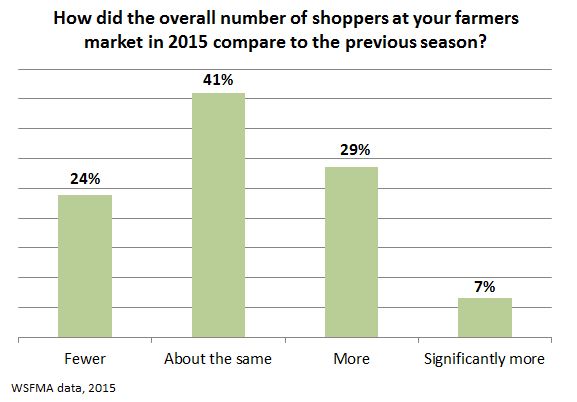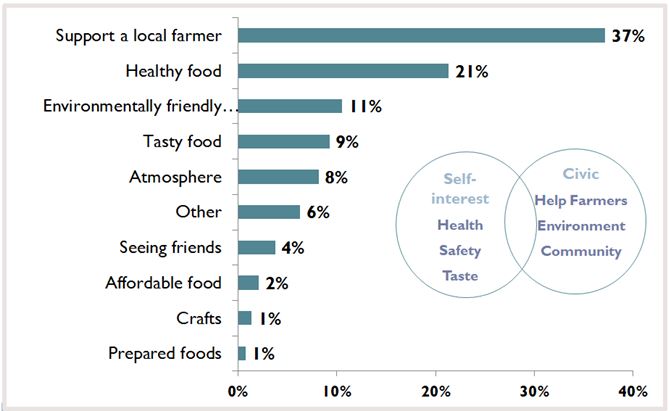By Colleen Donovan, WSU Small Farms Program
Updated: 9-23-2016
Farmers markets in Washington State report an average of around 1,400 shoppers per market day and 36,000 for the 2015 season. Of course, the range of shoppers varies widely by market, location, number of market days, market age, and size. The largest markets report nearly 9,000 shoppers on a typical day and over 454,000 for the season. Collectively, WSFMA member markets reported 3.4 million shoppers in 2015. What do we know about our farmers market shoppers?
Shoppers today have more choices than ever on how to buy local and organic food. In 2015, 41% of Washington farmers markets thought the number of shoppers stayed “about the same,” while 36% thought there were “more” or “significantly more” shoppers. Almost a quarter of markets reported having fewer shoppers.
 We can think of two main types of farmers market shoppers: core shoppers and occasional shoppers. “Core” farmers market shoppers spend at least $20.00 and come once a month or more. These are people who make an effort to come even when the weather is bad, and self-identify with “their” farmers market. Occasional shoppers enjoy the market and may bring out of town visitors, but don’t make a point of going on a regular basis, and don’t do any serious shopping. Given farmers markets’ meager marketing budgets, it is usually more cost effective and efficient to focus on core farmers market shoppers.
We can think of two main types of farmers market shoppers: core shoppers and occasional shoppers. “Core” farmers market shoppers spend at least $20.00 and come once a month or more. These are people who make an effort to come even when the weather is bad, and self-identify with “their” farmers market. Occasional shoppers enjoy the market and may bring out of town visitors, but don’t make a point of going on a regular basis, and don’t do any serious shopping. Given farmers markets’ meager marketing budgets, it is usually more cost effective and efficient to focus on core farmers market shoppers.
Overall, the shopper base supporting farmers markets is diversifying and reflective of the local community.
We know from WSU’s 14 Rapid Market Assessments that Washington shoppers report a mix of motivations, from self-interest to civic values. Regardless of where we went in the state, “supporting a local farmer” was shoppers’ top reason for shopping at the market.
Motivations for Shopping at Farmers Market (N = 4,720)
 Source: WSU Rapid Market Assessments, 2009-2014
Source: WSU Rapid Market Assessments, 2009-2014
Core Farmers Market Demographics
- Predominantly female (>65%)
- Mix of ages: from Generation Y and Gen X to Baby Boomers
- “Non-poor” and not necessarily high middle income (research is inconclusive)
- Tends to have more than one adult per shopping group
- Tend to have higher levels of formal education
Core Farmers Market Shopper Attributes
- Are responsible for cooking and meal preparation; enjoy cooking
- Buy organic and local foods
- Seek products that are fresh, healthy, safe
- Seek specialty items
- Value positive social and environmental impacts
- How food is produced is important to core shoppers
- Seek/expect authenticity and transparency in their purchasing
- Have non-food related habits to promote health (i.e., exercise)
- Enjoy gardening
- Core FM shoppers are not necessarily “foodies” and represent a much broader range of ideologies and politics.